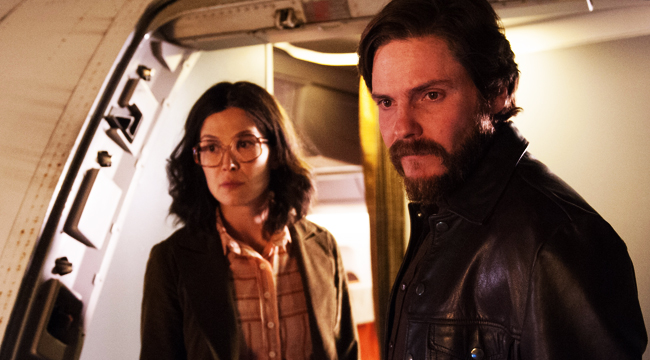
7 Days in Entebbe begins with a hijacking and ends with a raid but in every possible sense seems confused as to what to place in the middle of those two events. It presents itself as a docudrama — screaming title cards announcing locations, handheld cameras for the you-are-there effect — but takes odd diversions from that style as if unsure about committing to it. And, in retelling a story whose political implications could still start a screaming match decades later, it takes a mushy approach seemingly determined to offend no one, or at least offend no one all that much or for very long.
The film revisits a 1976 incident in which four terrorists — two from Palestine and two from Germany — hijacked an Air France flight en route from Tel Aviv to Paris following a stop in Athens, with the ultimate goal of earning the release of 53 prisoners. To this end, they forced the crew to fly first to Libya then to Uganda, landing at the Entebbe airport where they were greeted by Idi Amin, who gave the terrorists shelter until a raid by Israeli commandos ended the stand-off, killing the hijackers, rescuing most of the hostages, and losing only one soldier in the process — the older brother of Benjamin Netanyahu, now currently serving as Israel’s Prime Minister.
Working from a script by Gregory Burke (’71), director José Padilha, attempts to take the long view of the incident without sacrificing a sense of immediacy. But the 7 Days doesn’t really achieve either. Padilha — who made his name in Brazil with the Elite Squad films before coming to Hollywood for a little-loved remake of RoboCop — attempts to cover every possible angle, switching between the stories of the two German hijackers, Brigitte Kuhlmann (Rosamund Pike) and Wilifried Böse (Daniel Brühl); Zeev Hirsch (Ben Schnetzer), an Israeli soldier involved in the raid played by; and the political debate leading up to the operation as headed by Prime Minister Yitzhak Rabin (Lior Ashkenazi) and future Prime Minister Shimon Peres (Eddie Marsan). But after a well-staged hijacking sequence opens the film, none of the stories work. And, in spite of the piles of exposition Burke’s script gives to the characters, the film most likely won’t leave many viewers feeling like they know much more than the raw facts of the incident.
As the Germans, Brühl and Pike get the lion’s share of the scenes, but the time spent with them doesn’t really provide the context needed to understand their characters. Both see themselves as idealists, not terrorists, working for a more just world on behalf of the Palestinians. Brühl’s Wilifried is particularly sensitive to being perceived as anti-Semitic given his country’s past. Yet even with the occasional flashback, the film never establishes what drove them to this moment and 7 Days does Pike no favors by giving her an impossible-to-act late-film phone conversation delivered in a deluded daze. Elsewhere, Rabin and Peres’ power struggle seems consciously designed to foreshadow the political developments that will shape the Middle East in the decades that followed.
The film’s biggest problem, however, is that it’s unforgivably dull once the plane touches down in Uganda and the hostages and their captors wait and wait and wait for new developments. Even the climactic raid, which should play to Padilha’s strengths, doesn’t deliver apart from a handful of striking images. One character makes a choice that should be the climax to a film’s worth of soul-searching, but it barely registers. Worst of all, Padiah intercuts the raid with scenes from a contemporary dance performance featuring Hisch’s dancer girlfriend, a choice that, to put it kindly, could have worked better. But then so could 7 Days as a whole, which labors in the shadow of better films like Battle of Algiers, the gold standard for political docudramas, and Carlos, which offers a much more compelling look at ‘70s underground politics and the ugliness of an era in which ‘60s activism sometimes mutated into violent, radical approaches to political change, making strange bedfellows of those who professed a desire to work for peace and those who thought their goals only attainable from behind a gun. It’s a time whose repercussions still resonate today, though they’re hard to feel here.
